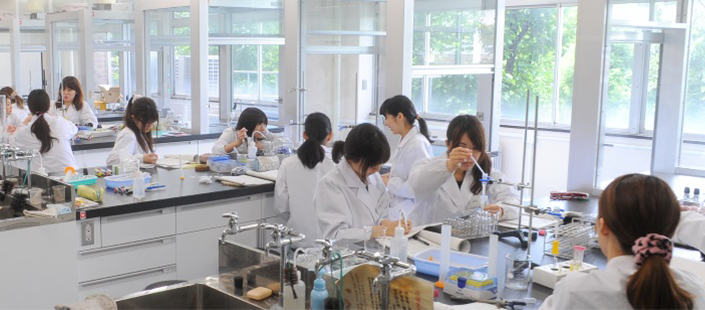- Top
- Chemistry
ページの本文です。

Chemistry
Chemistry
From Real Life to Computational Chemistry,
Everything in the Universe and Cutting-Edge Science Starts in the World of Atoms and Molecules
The natural world—including living organisms, Earth, and the universe itself—is made up of various types of matter.
Chemistry is a discipline that organizes the knowledge obtained by studying the transformations occurring when the atoms and molecules that form matter are combined. For instance, even though almost everything around us is composed of chemical compounds that are synthesized chemically, endless possibilities still exist for creating new materials through chemistry.
By mastering the basics of chemistry, chemistry can be developed from the origins of life, biological phenomena, and research in nanospace to many application such as industrial chemistry, agricultural chemistry, pharmaceutical chemistry, and so on.
Objective: Developing Individuality through Small Class Sizes
Since this is a small department, it offers education that painstakingly matches the needs of the individual. Students of the same class year naturally interact with each other, and there are also many opportunities to interact with students of different classes as well as graduates. The program is also characterized by the ability to study topics in anticipation of future developments and careers. Each teacher’s research field extends beyond basic chemistry to cover a wide range of specialties, including the synthesis of functional materials or supermolecules, biochemistry and computational chemistry, so students can develop various interests as part of their special research.
More than 75 percent of Chemistry program students go on to graduate school to take master’s programs, and there is a system for allowing students with excellent grades to skip years and directly enroll in graduate school. Since expertise in chemistry is vital to various fields, many graduates work in the research laboratories and research and development departments of chemical, pharmaceutical, cosmetic, electrical and other corporations, as well as in a wide range of positions in the civil service, education, the media and other industries.
Features: From Basic to Applied Chemistry
This program offers courses on a wide range of topics that include physical chemistry, inorganic chemistry, analytical chemistry, organic chemistry and biochemistry. Students can count on a thorough and balanced curriculum of lectures and experimental (practical training) courses in both basic and applied chemistry.
The curricula are designed in such a way that students can learn the basics of chemistry through the main program and then select a supplemental program or other elective program to refine their ability to think and analyze based on basic knowledge. Fourth-year students take the Research Course (graduation research) to experience cutting-edge research, attaining the ability to carry out their own research. In addition, lectures that showcase the research of instructors (such as the Special Seminar in Chemistry) allow students to encounter advanced research from their first year in the program. Another attractive feature of the Chemistry program is that it offers a unique organization for chemistry graduates, called the OUCA, which provides close contact and an exchange of employment information with graduates.
Laboratory Course of Fundamental Chemistry
Students conduct basic chemistry experiments and master the core experimental techniques (weighing operations, handling of apparatuses and reagents, extraction of substances, equipment measurement, and so on) and knowledge necessary to take Advanced Chemistry Experiment I.
Advanced Chemistry Experiment
Students conduct advanced experiments in physical chemistry, inorganic chemistry, analytical chemistry, organic chemistry and biochemistry. In addition to conducting experiments using cutting-edge analytical equipment, they also master the knowledge and techniques and build the intellectual capacity needed to form the foundation of research, including the ability to search for information regarding the attributes and structures of matter.
Special Seminar in Chemistry
New students are split into small groups and visit the laboratories of all Chemistry teachers. Instructors conduct classes in a seminar format. Students acquire a basic knowledge of chemistry and develop their interest in research.
English for Chemists
Students learn the English that chemists use from native speakers in a seminar format. The goal is to improve their ability to read English-language research papers by familiarizing them with technical terms in chemistry and expressions and grammar specific to English used in this field.
Chemistry Seminar
Fourth-year students attached to a laboratory read, evaluate and present scientific papers regarding their graduation research in this seminar-format course, thereby deepening their knowledge and cultivating their English-language technical reading comprehension skills.
Research Course
Based on advice from their instructors, students formulate their own research plans that reflect a personal research theme, develop the background and goals of their research, and conduct graduate-level research.







